|
Refit: Winter 2008-2009
|
Winter 2008-2009 Refit | Saturday, May 2, 2009
To
help secure my second CQR anchor (this one a 25 lb. version)
tightly to its roller--the existing roller was for a larger
Bruce anchor, and wasn't designed for the CQR--I installed
an anchor tensioner to the anchor platform. Secured
only with screws, I didn't intend for the tensioning device
to be the sole means of anchor security, but merely to hold
the chain tight and therefore hold the anchor tightly
against the roller. To fully secure the anchor, I
added a length of line. I wasn't sure how this anchor
was going to work on the roller and next to the main 35 lb.
CQR, so this entire project was a bit of an experiment as I
continued to search for the best combination of anchors and
storage possibilities.
My anchor platform is
decrepit; I didn't varnish it over the winter. Forgive
me. I'm still undecided how or whether to make changes
to the overall setup. |
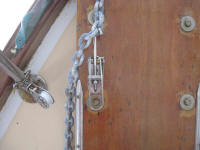 |
Several years ago,
when I installed my Strong Track for the mainsail, I ended
the track an inch or so below the terminus of the external
bronze track--logically and as directed. This location
was 8-10 inches above the height of the gooseneck.
However, I determined that this created a reefing problem:
the stack height of the slugs was such that the reefing ears
wouldn't reach the reefing hook, for neither the first nor
second reef.
To get around this, I installed a couple
shackles that I had on board to extend the first reefing ear
enough to allow me to hook it and make it usable. This
was acceptable enough for a few years, but there was no
chance of hooking the second reef. Fortunately, I
never needed the second reef during this time. You can
see the reefing ear, the shackles, and the general first
reef setup in this photo. Clearly the slugs needed to
come down further. |
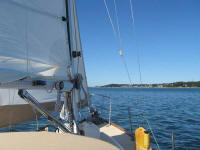 |
I wanted a better
solution. Through my sail loft, I eventually
discovered that Tides Marine, maker of the Strong Track,
offered an extension for this purpose. The extension
was simply a short length of track that incorporated the
wide slug feed at the bottom, with a clip at the top end to
secure the two pieces together. I ordered the
appropriate section.
To install the extension, I
first determined where to cut the old track by holding the
15" extension in place and marking the old track with tape.
This provided enough overlap to remove the old feed section
and allow the new extension to slide partway onto the bronze
track. |
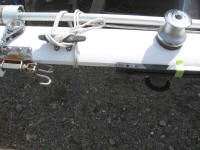 |
Next, I unscrewed the
single screw that held the track in place at the bottom, and
slid the existing track down enough to allow me to cut off
the track at my mark. |
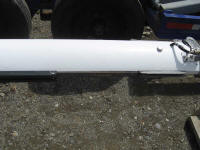
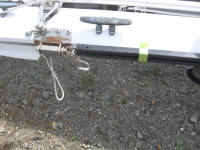
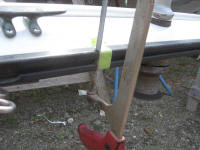 |
Then, I
slid on the extension and double-checked my placement (I
left the new bottom of the track about 2" above the
gooseneck to avoid clearance issues when loading the slugs),
and then drilled two holes through the track (which extend
through the solid center portion of the track) for the slim
bolts provided, which secured the two pieces of track
together. Finally, I drilled and tapped at the bottom
of the track for a new screw with which to secure the end.
There ended up being a slight seam at the joint, caused
by imperfect cuts on one or both pieces of track, but since
this seam was at the bottom of the track, and easily
reachable, I didn't see any problem with it even if the
slugs should hang up slightly. But now the stacked
slugs would extend nearly to the gooseneck, which would make
reefing (both reef points) much easier and also reduce the
overall stack height when the sail was lowered, which would
have the side benefit of easing pressure on my sailcover,
which barely covered the old stack height. |

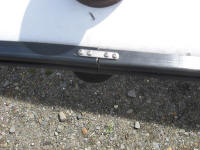 |
I vacillated on
whether to move the boat outdoors at this point. My
only reason to do so was to allow me to run the engine and
wash the boat more easily, and eventually I decided there
was no further reason for her to be indoors. The
weather had been improving, and I didn't really have
anything left to do other than the usual final pre-launch
jobs. So I loaded the boat on my trailer and moved her
outdoors so I could take care of my engine test-run and
other jobs at my leisure over the next few weeks before
launch day. I thought the boat looked pretty nice this
year.
She was dusty from being indoors, which might
be visible in these photos, so late in the day, when the sun
was behind the building, I gave her a fresh water rinse to
remove the dust. |
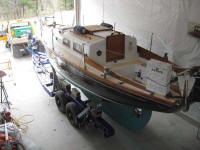
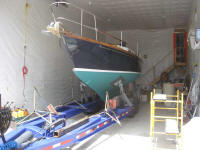
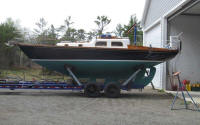
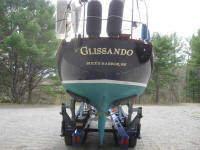
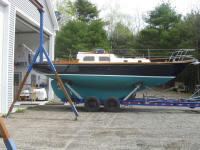
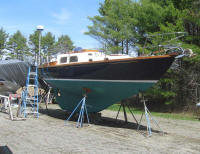
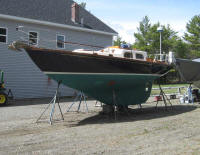
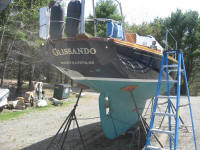 |
Total time today:
3 hours
Previous |
Next |
|